| Listing 1 - 10 of 10 |
Sort by
|
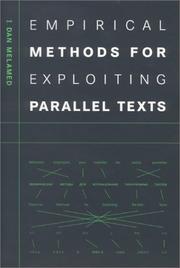
ISBN: 0262133806 Year: 2001 Publisher: Cambridge, Mass. MIT
Abstract | Keywords | Export | Availability | Bookmark
 Loading...
Loading...Choose an application
- Reference Manager
- EndNote
- RefWorks (Direct export to RefWorks)
Mathematical linguistics --- Translation science --- Linguistic models. --- Automatisch vertalen. --- Computerlinguïstiek. --- Corpus linguistics. --- Linguïstische modellen. --- Parallelteksten.
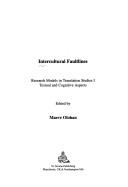
ISBN: 1900650444 9781900650441 Year: 2000 Publisher: Manchester St. Jerome Publishing
Abstract | Keywords | Export | Availability | Bookmark
 Loading...
Loading...Choose an application
- Reference Manager
- EndNote
- RefWorks (Direct export to RefWorks)
Intercultural Faultlines offers an exploration of research models and methods in translation studies, as implemented, discussed and critically evaluated by some of the leading researchers in the field of translation and interpreting. While the focus throughout is on textual and cognitive aspects of translation and interpreting, the objects of study and consequently the methodological considerations are wide-ranging. The volume contains chapters focusing on research conducted in areas as diverse as corpus-based translation studies, dialogue interpreting, simultaneous interpreting, acquisition of translation competence, cognitive processes in translation, translation into the L2, creativity in translation and translation quality assessment. Some research models and methods are applied to translation for the first time, while others are more established and can be assessed in terms of their reliability and the generalizability of the results they yield. Issues of research design and methodology are addressed, and interesting questions are raised which are likely to become the focus of attention in future research, for example with regard to causal models of translation, translational ethics, collaborative research and issues of power in interpreting research.
Translation science --- Translating and interpreting --- Linguistic models --- Research --- Methodology --- 82.03 --- #KVHA:Vertaalwetenschap --- Vertalen. Literaire vertaling --- Linguïstische modellen --- Tolken --- Vertalen --- research --- methodologie --- 82.03 Vertalen. Literaire vertaling --- Linguïstische modellen. --- methodologie. --- Interpretation and translation --- Interpreting and translating --- Language and languages --- Literature --- Translation and interpretation --- Translators --- Models, Linguistic --- Linguistics --- Typology (Linguistics) --- Research&delete& --- Translating --- Translating and interpreting - Research - Methodology --- Traduction et interprétation --- Recherche

ISBN: 1575862204 1575862190 Year: 2000 Publisher: Stanford, Calif. Center for the Study of Language and Information
Abstract | Keywords | Export | Availability | Bookmark
 Loading...
Loading...Choose an application
- Reference Manager
- EndNote
- RefWorks (Direct export to RefWorks)
Linguistic analysis (Linguistics). --- Linguistic models. --- Cognitieve grammatica --- Gebruiksgerichte taalwetenschap --- Linguïstische analyse --- Linguïstische modellen --- Cognitieve grammatica. --- Gebruiksgerichte taalwetenschap. --- Linguïstische analyse. --- Linguïstische modellen. --- 801.56 --- 801.56 Syntaxis. Semantiek --- Syntaxis. Semantiek --- Linguistic analysis (Linguistics) --- Linguistic models --- Models, Linguistic --- Linguistics --- Typology (Linguistics) --- Analysis, Linguistic (Linguistics) --- Analysis (Philosophy) --- Grammar, Comparative and general --- Pragmatics

ISBN: 0792305175 9401073503 9400919069 Year: 1989 Publisher: Dordrecht Kluwer
Abstract | Keywords | Export | Availability | Bookmark
 Loading...
Loading...Choose an application
- Reference Manager
- EndNote
- RefWorks (Direct export to RefWorks)
Mathematical linguistics --- Analyse linguistique (Linguistique) --- Linguistic analysis (Linguistics) --- Linguistic models --- Linguïstische modellen --- Modèles linguistiques --- Taalanalyse (Taalwetenschap) --- Models, Linguistic --- Linguistics --- Typology (Linguistics) --- Analysis, Linguistic (Linguistics) --- Analysis (Philosophy) --- Grammar, Comparative and general --- Modèles linguistiques --- Linguistic models.

ISBN: 3487114348 Year: 2001 Volume: 6 Publisher: Hildesheim Olms
Abstract | Keywords | Export | Availability | Bookmark
 Loading...
Loading...Choose an application
- Reference Manager
- EndNote
- RefWorks (Direct export to RefWorks)
Linguistic models --- Linguïstische modellen --- Modèles linguistiques --- Semantics --- Semantiek --- Sémantique --- Sémasiologie --- Models, Linguistic --- Linguistics --- Typology (Linguistics) --- Formal semantics --- Semasiology --- Semiology (Semantics) --- Comparative linguistics --- Information theory --- Language and languages --- Lexicology --- Meaning (Psychology)
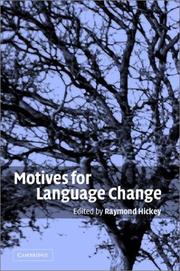
ISBN: 0521793033 0521135249 1107122112 051117733X 0511041276 0511158297 0511325681 0511486936 1280432993 0511047223 9780511041273 9780511047220 9780521793032 9780511486937 9781280432996 9780521135245 Year: 2003 Publisher: Cambridge Cambridge University Press
Abstract | Keywords | Export | Availability | Bookmark
 Loading...
Loading...Choose an application
- Reference Manager
- EndNote
- RefWorks (Direct export to RefWorks)
This specially commissioned volume considers the processes involved in language change and the issues of how they can be modelled and studied. The way languages change offers an insight into the nature of language itself, its internal organisation, and how it is acquired and used. Accordingly, the phenomenon of language change has been approached from a variety of perspectives by linguists of many different orientations. This book, originally published in 2003, brings together an international team of leading figures from different areas of linguistics to re-examine some of the central issues in this field and also to discuss new proposals. The volume is arranged into sections, including grammaticalisation, the typological perspective, the social context of language change and contact-based explanations. It seeks to cover the subject as a whole, bearing in mind its relevance for the general analysis of language, and will appeal to a broad international readership.
Linguistic change --- Languages in contact --- Linguistic models --- Linguistic change. --- Linguistic models. --- Contactlinguïstiek. --- Linguïstische modellen. --- Taalverandering. --- Sociolinguistics --- Dialectology --- 800 --- Models, Linguistic --- Linguistics --- Typology (Linguistics) --- Change, Linguistic --- Language change --- Historical linguistics --- Language and languages --- Areal linguistics --- 800 Taalwetenschap. Taalkunde. Linguistiek --- Taalwetenschap. Taalkunde. Linguistiek --- Arts and Humanities --- Language & Linguistics --- Languages in contact.
Book
ISBN: 9781441150479 1441150471 9781441148414 1441148418 9786612590658 1441138153 1282590650 9781441138156 9781282590656 6612590653 Year: 2010 Publisher: London New York Continuum
Abstract | Keywords | Export | Availability | Bookmark
 Loading...
Loading...Choose an application
- Reference Manager
- EndNote
- RefWorks (Direct export to RefWorks)
This edited collection draws together diverse international work on formulaic language such as idioms, collocations, lexical bundles and phrasal verbs. Formulaic sequences are more or less fixed word combinations such as idioms, collocations, lexical bundles, phrasal verbs and so on. Study in this area has grown over the past fifteen years, despite the fact that there are no academic journals or conferences devoted to this topic. This edited collection is an attempt to draw together the diverse international work on formulaic language. It features an introduction by Dr Regina Weinert, a pionee
Discourse analysis --- Language acquisition --- Collocaties (taalkunde). --- Discourse analysis. --- Formulaire taal --- Formulaire taal. --- Idioom. --- Language acquisition. --- Linguistic analysis (Linguistics). --- Linguistic models. --- Linguïstische modellen. --- Taalverwerving. --- vertalen. --- Linguistic analysis (Linguistics) --- Linguistic models --- Models, Linguistic --- Linguistics --- Typology (Linguistics) --- Analysis, Linguistic (Linguistics) --- Analysis (Philosophy) --- Grammar, Comparative and general --- Acquisition of language --- Developmental linguistics --- Developmental psycholinguistics --- Language and languages --- Language development in children --- Psycholinguistics, Developmental --- Interpersonal communication in children --- Psycholinguistics --- Discourse grammar --- Text grammar --- Semantics --- Semiotics --- Acquisition
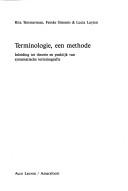
ISBN: 9033420821 Year: 1990 Volume: 153 Publisher: Leuven Acco
Abstract | Keywords | Export | Availability | Bookmark
 Loading...
Loading...Choose an application
- Reference Manager
- EndNote
- RefWorks (Direct export to RefWorks)
81-13 --- Nederlands --- linguïstiek --- software --- taalgebruik --- terminologie --- vertalen --- Methodologie van de taalwetenschap. Methoden en gereedschappen --- Terminologieleer. --- Documentation --- Terms and phrases --- AA / International- internationaal --- 031 --- 8 --- Terminology --- Filologie. Letterkunde. --- Philologie. Littérature. --- Philology. Literature. --- 8 Filologie. Letterkunde. --- 8 Philologie. Littérature. --- 8 Philology. Literature. --- Verklarende, etymologische woordenboeken. --- Linguïstische modellen. --- Terminologie --- research. --- Names --- Sublanguage --- Allusions --- Information science --- Information services --- Library science --- Verklarende, etymologische woordenboeken --- Filologie. Letterkunde --- Lexicology. Semantics --- Documentation. --- Terms and phrases. --- Logic --- Logique --- Research.
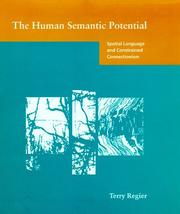
ISBN: 0262181738 0262282232 0262527308 0585032610 9780262181730 9780262282239 9780585032610 9780262527309 Year: 1996 Volume: *2 Publisher: Cambridge, Mass. MIT
Abstract | Keywords | Export | Availability | Bookmark
 Loading...
Loading...Choose an application
- Reference Manager
- EndNote
- RefWorks (Direct export to RefWorks)
"Drawing on ideas from cognitive linguistics, connectionism, and perception, The Human Semantic Potential describes a connectionist model that learns perceptually grounded semantics for natural language in spatial terms. Languages differ in the ways in which they structure space, and Regier's aim is to have the model perform its learning task for terms from any natural language. The system has so far succeeded in learning spatial terms from English, German, Russian, Japanese, and Mixtec. The model views simple movies of two-dimensional objects moving relative to one another and learns to classify them linguistically in accordance with the spatial system of some natural language. The overall goal is to determine which sorts of spatial configurations and events are learnable as the semantics for spatial terms and which are not. Ultimately, the model and its theoretical underpinnings are a step in the direction of articulating biologically based constraints on the nature of human semantic systems. Along the way Regier takes up such substantial issues as the attraction and the liabilities of PDP and structured connectionist modeling, the problem of learning without direct negative evidence, and the area of linguistic universals, which is addressed in the model itself. Trained on spatial terms from different languages, the model permits observations about the possible bases of linguistic universals and interlanguage variation."
Lexicology. Semantics --- Psycholinguistics --- Cognitieve spraakkunst --- Cognitive grammar --- Connectionism --- Connectionisme --- Connectionnisme --- Connexionism --- Espace et temps dans la langue --- Espace et temps dans le langage --- Expression de l'espace et du temps (Linguistique) --- Grammaire cognitive --- Grammar [Cognitive ] --- Langage -- Expression de l'espace et du temps --- Linguistic models --- Linguïstische modellen --- Modèles linguistiques --- Ruimte en tijd in de taal --- Space and time in language --- Spraakkunst [Cognitieve ] --- Temps et espace dans le langage --- Space and time in language. --- Semantics --- Connectionism. --- Cognitive grammar. --- Linguistic models. --- Sémantique --- Connexionnisme --- Psychological aspects. --- Aspect psychologique --- -Space and time in language --- Language and languages --- Formal semantics --- Semasiology --- Semiology (Semantics) --- Comparative linguistics --- Information theory --- Lexicology --- Meaning (Psychology) --- Models, Linguistic --- Linguistics --- Typology (Linguistics) --- Cognition --- Cognitive linguistics --- Grammar, Comparative and general --- Psychological aspects --- Languages & Literatures --- Philology & Linguistics --- Linguistique cognitive --- Psycholinguistique cognitive --- Sémantique --- Modèles linguistiques --- COGNITIVE SCIENCES/General --- LINGUISTICS & LANGUAGE/General
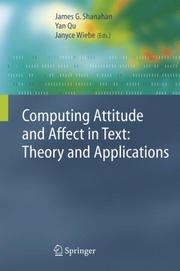
ISBN: 1402040261 1402041020 1280460156 9786610460151 9400792573 Year: 2006 Publisher: Dordrecht ; [Great Britain] : Springer,
Abstract | Keywords | Export | Availability | Bookmark
 Loading...
Loading...Choose an application
- Reference Manager
- EndNote
- RefWorks (Direct export to RefWorks)
Human Language Technology (HLT) and Natural Language Processing (NLP) systems have typically focused on the “factual” aspect of content analysis. Other aspects, including pragmatics, opinion, and style, have received much less attention. However, to achieve an adequate understanding of a text, these aspects cannot be ignored. The chapters in this book address the aspect of subjective opinion, which includes identifying different points of view, identifying different emotive dimensions, and classifying text by opinion. Various conceptual models and computational methods are presented. The models explored in this book include the following: distinguishing attitudes from simple factual assertions; distinguishing between the author’s reports from reports of other people’s opinions; and distinguishing between explicitly and implicitly stated attitudes. In addition, many applications are described that promise to benefit from the ability to understand attitudes and affect, including indexing and retrieval of documents by opinion; automatic question answering about opinions; analysis of sentiment in the media and in discussion groups about consumer products, political issues, etc. ; brand and reputation management; discovering and predicting consumer and voting trends; analyzing client discourse in therapy and counseling; determining relations between scientific texts by finding reasons for citations; generating more appropriate texts and making agents more believable; and creating writers’ aids. The studies reported here are carried out on different languages such as English, French, Japanese, and Portuguese. Difficult challenges remain, however. It can be argued that analyzing attitude and affect in text is an “NLP”-complete problem.
Computational linguistics. --- Computerlinguïstiek. --- Computing attitude. --- Information retrieval --- Information storage and retrieval systems --- Lexicologie --- Lexicology --- Linguistic models --- Linguïstische modellen --- Natural language processing (Computer science). --- Natural language processing. --- Natuurlijke taalverwerking. --- Pattern recognition systems. --- Taaltechnologie. --- gegevensverwerking. --- Data processing. --- gegevensverwering. --- Computer science. --- Library science. --- Information storage and retrieval. --- Artificial intelligence. --- Computer Science. --- Information Storage and Retrieval. --- Library Science. --- Computer Science, general. --- Information Systems Applications (incl. Internet). --- Artificial Intelligence (incl. Robotics). --- Language Translation and Linguistics. --- Automatic language processing --- Language and languages --- Language data processing --- Linguistics --- Natural language processing (Linguistics) --- Applied linguistics --- Cross-language information retrieval --- Mathematical linguistics --- Multilingual computing --- AI (Artificial intelligence) --- Artificial thinking --- Electronic brains --- Intellectronics --- Intelligence, Artificial --- Intelligent machines --- Machine intelligence --- Thinking, Artificial --- Bionics --- Cognitive science --- Digital computer simulation --- Electronic data processing --- Logic machines --- Machine theory --- Self-organizing systems --- Simulation methods --- Fifth generation computers --- Neural computers --- Librarianship --- Library economy --- Bibliography --- Documentation --- Information science --- Informatics --- Science --- Data processing --- Text processing (Computer science) --- Processing, Text (Computer science) --- Database management --- Word processing --- Automatic data storage --- Automatic information retrieval --- Automation in documentation --- Computer-based information systems --- Data processing systems --- Data storage and retrieval systems --- Discovery systems, Information --- Information discovery systems --- Information processing systems --- Information retrieval systems --- Machine data storage and retrieval --- Mechanized information storage and retrieval systems --- Computer systems --- Electronic information resources --- Data libraries --- Digital libraries --- Information organization --- Information Technology --- Computer Science (Hardware & Networks) --- Computational linguistics --- Natural language processing (Computer science) --- Pattern recognition systems --- Pattern classification systems --- Pattern recognition computers --- Pattern perception --- Computer vision --- Models, Linguistic --- Typology (Linguistics) --- NLP (Computer science) --- Artificial intelligence --- Human-computer interaction --- Semantic computing --- Computing attitude --- Information storage and retrieva. --- Artificial Intelligence. --- Natural Language Processing (NLP). --- Information storage and retrieval systems. --- Application software. --- Application computer programs --- Application computer software --- Applications software --- Apps (Computer software) --- Computer software --- Data centers
| Listing 1 - 10 of 10 |
Sort by
|

 Search
Search Feedback
Feedback About UniCat
About UniCat  Help
Help News
News